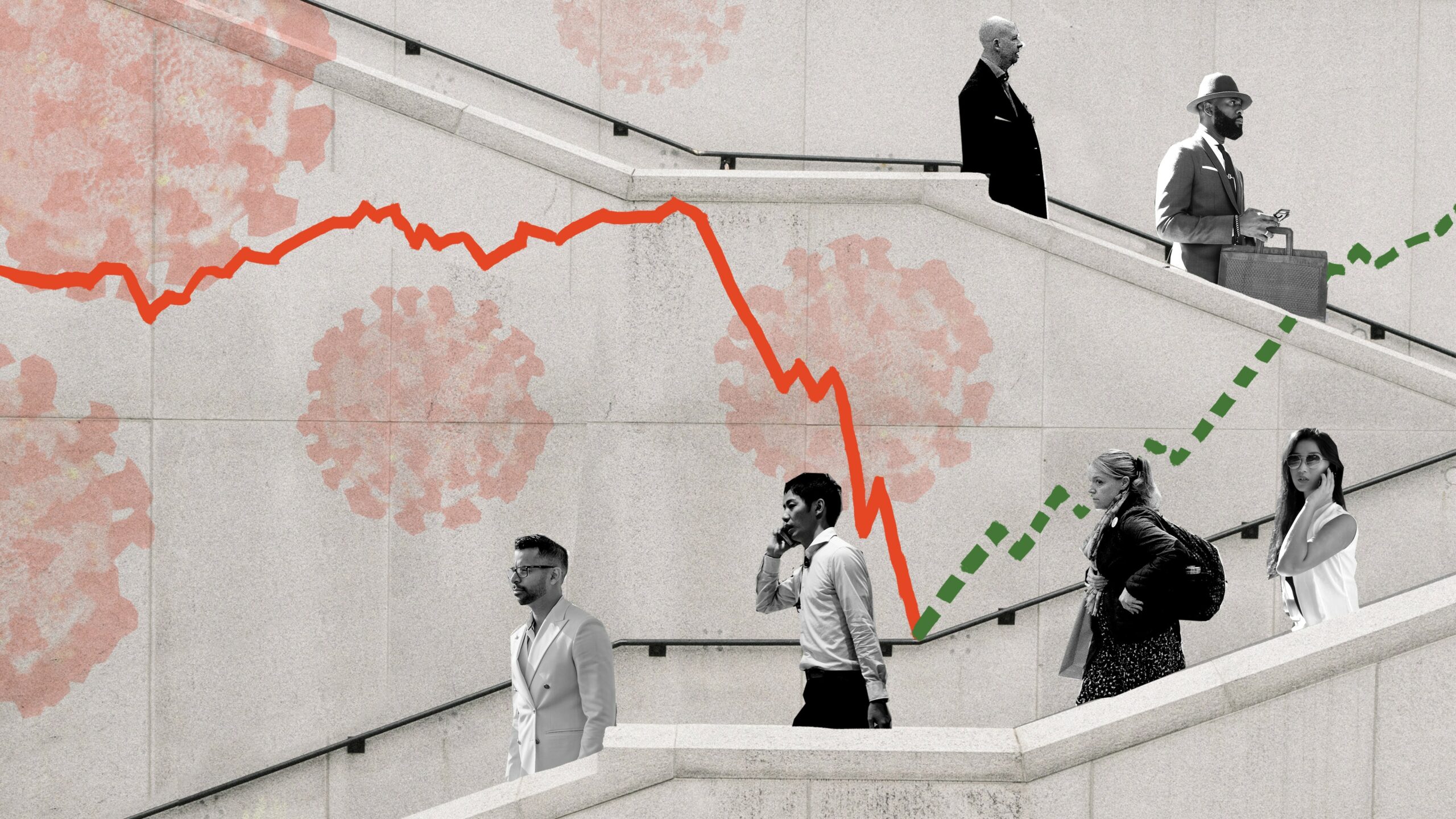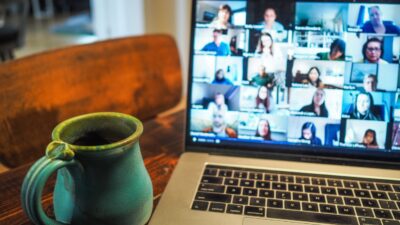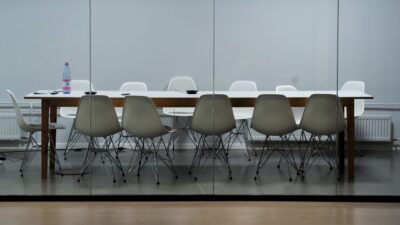Sandra Peter and Kai Riemer

Work changes on Corona Business Insights
From presenteeism to the hybrid workforce. What changes when remote working is here to stay?
As COVID-19 sets out to change the world forever, join Sandra Peter and Kai Riemer as they think about what’s to come in the future of business.
Shownotes
Remote working is not going away: who wins and loses when workers stay home?
The seven worst aspects of working at home and what to do About them
What the Dutch can teach the world about remote work
Hybrid remote work offers the worst of both worlds
The 9-5 day is ‘out of the question’: Here’s what going back to work in an office will be like
Companies are enforcing their own contact tracing to track employees
What should we do with 45,000 half-empty public buildings?
Our previous discussions on the ideal worker, corporate surveillance, employee monitoring and productivity when remote working
This episode is part of a podcast series covering what COVID-19 will mean for the business world, where we look at the impact on the economy, businesses, industries, workers and society. This is part of our ongoing coverage of the impact of COVID-19 on the future of business.
Follow the show on Apple Podcasts, Spotify, Overcast, Google Podcasts, Pocket Casts or wherever you get your podcasts. You can follow Sydney Business Insights on Flipboard, LinkedIn, Twitter and WeChat to keep updated with our latest insights.
Send us your news ideas to sbi@sydney.edu.au.
Dr Sandra Peter is the Director of Sydney Executive Plus and Associate Professor at the University of Sydney Business School. Her research and practice focuses on engaging with the future in productive ways, and the impact of emerging technologies on business and society.
Kai Riemer is Professor of Information Technology and Organisation, and Director of Sydney Executive Plus at the University of Sydney Business School. Kai's research interest is in Disruptive Technologies, Enterprise Social Media, Virtual Work, Collaborative Technologies and the Philosophy of Technology.
Share
We believe in open and honest access to knowledge.
We use a Creative Commons Attribution NoDerivatives licence for our articles and podcasts, so you can republish them for free, online or in print.
Transcript
This transcript is the product of an artificial intelligence - human collaboration. Any mistakes are the human's fault. (Just saying. Accurately yours, AI)
Intro From the University of Sydney Business School, this is Sydney Business Insights.
Sandra And this is Corona Business Insights. I'm Sandra Peter.
Kai And I'm Kai Riemer.
Sandra And with everything that's happening, it's been difficult to understand what COVID-19 might mean for the business world. So in this series, we've been unpacking its impact on business, the economy, industry, government, workers and society and looking at the effects of the pandemic.
Kai And this podcast is, of course, part of a larger initiative by the University of Sydney Business School. Our COVID business impact dashboard is a living initiative which we constantly update with insights and resources from our academics, from industry experts, Nobel Prize winners, and movers and shakers.
Sandra And you can find all of these resources online at sbi.sydney.edu.au/coronavirus.
Kai And today we talk about work. In recent episodes, we have talked about how the office changes with the COVID-19 pandemic, about productivity and remote work. We have talked about the ideal worker, about commuting. We've talked about corporate surveillance/employee monitoring. And today we're going to give you an update about recent developments in this space.
Sandra With many places coming out of lockdown and many people returning to work, it does seem that remote working is here to stay. And whilst in places like Australia, the UK and the US, the number of people who worked remotely before the outbreak was fairly low, around three, four, five percent, as we are going back to work it does seem, however, that many of us will likely keep some sort of the flexible work arrangements going forward. Insurance companies like MetLife estimate that that number might be as high as 40 percent here in Australia. Companies like Optus and Westpac have similarly announced shifts to more long-term remote working for many of their employees. So today we want to discuss a bit where that leaves us in terms of the balance between some of us going back to the office and other people keeping flexible, remote working arrangements.
Kai There has been a notable shift in recent reporting, while going back to the office was initially talked about here in Australia in terms of mainly social distancing, as we are coming out of the lockdown, restrictions are being eased. The conversation has notably shifted more towards the perceived benefits of remote working. So the argument is no longer one that is predominantly driven by the need to keep some of the workforce working remotely because numbers in the office have to be reduced, but rather by the advantages of remote working as a form of working that is here to stay and that might complement working from the office. And some of the benefits are that the nine to five presenteeism, just being in the office, is not really serving any purpose, that many workers are actually, at least not less, but sometimes more productive when working from home, the ability to attract a more diverse workforce, or a improved work life balance.
Sandra And here we must note the two sides of that conversation, because on the one hand, while media has been reporting that people have been able to be closer to their families, to take fitness classes, to eat and cook better meals, to work more efficiently, other early studies highlight the risk of the work being a lot more intense and have a lot longer duration. We've reported previously on remote workers in the US working up to four hours a day more than when they were in the office in an attempt to compensate for the fact that their work is not seen by their managers, that because they're not seen in the office, they're only evaluated on the output of their work and how this can bleed into outside of the traditional nine to five in people's weekends.
Kai And indeed, work life balance is one of the main issues here. On the one hand, work encroaching more on leisure time when you're at home, when there is no clear boundary between the office, your workplace and your family place. But on the other hand, also being closer to family. A study by Salesforce Australia revealed that 66 per cent of people said that working from home brings them closer to their family. Mind you, it was not said whether this was necessarily a good or a bad thing. So companies are thinking about the right way of managing remote work, bringing in policies that encourage people to switch off, to not communicate after hours, to observe a certain work life balance while, of course, keeping an eye on productivity, encouraging those who might struggle with procrastination to put in the effort that is required.
Sandra So it seems increasingly likely that with our return to the office most organisations will have some sort of hybrid model with two different employee experiences. As offices reopen, some people will go back to the office in the way of reinforcing the idea that certain jobs can only be done from the office. Others will remain at home, whether through the policies implemented by organisations or simply because they find it now easier to manage their work from home. But it is likely that this will, in many organisations, lead to a very dramatic and long-term shift in what used to be a very cohesive office culture.
Kai And indeed, there has been an article in Wired magazine recently which is titled "Hybrid Remote Work Offers the Worst of Both Worlds". And while the title is a little bit overdramatic, the point that the author makes is really valuable. When remote work is just tacked on to a traditional work model that centres around the office as the headquarters, as the place where the superiors, the supervisors reside, where the centre of power is, where being visible in the office carries certain clout in being evaluated, being part of conversations. Remote working for all its productivity gains in, you know, working through individual tasks, will always be a second rate mode of working because people will not be involved in those decision processes, leading to a fear of missing out. And the problems that you mentioned earlier around intensification or extends a vacation of work where people putting in the extra effort because they fear that their work is not valued as much as that of those who are in the office.
Sandra Similarly, many companies actually have to develop not only the support systems, processes and trainings needed to support a large remote workforce for an extended period of time, but also need to develop the corporate culture that takes that into account, as most organisations have never actually had to deal with this. What's more, as suggested in many of the articles that look at the remote work that suggests, you know, local hubs where employees can meet in their local communities to socialise and to have a change of scenery, don't yet exist. Neither the organisations nor the local communities have these in place. What's more, in many countries there is a distinct culture of presenteeism. In places like the UK, data shows that about 83 percent of employees report feeling the pressure of showing up regardless of their mental or physical well-being so that they are seen in the office. In the US, one in five employees report feeling guilty about taking any time away from the office, worrying that it signals that they are not committed to the job and that they are not seen in the organisation.
Kai And so the Wired article makes the point that businesses that want to be serious about remote work meet a 'remote work first' culture. Where the office as the centre of power is being displaced, where supervisors, the leaders of the company, move to remote working, and where office space is rethought to become more of a space for social gatherings rather than the locus of power. And the article also makes the point that remote working doesn't necessarily mean working from home. So work is just disentangled from the office, it can happen from anywhere. The company doesn't necessarily need the traditional setup of a permanently rented space. It can hire co-work spaces where people can, from time to time, gather and have those serendipitous moments with their colleagues, but otherwise work from anywhere from coffee shops, libraries. So to really rethink work in a space independent way where remote workers do not have to fear that they are second rate or second class workers in their organisation.
Sandra And this will probably also require a wider cultural shift around what we perceive as the ideal worker. We've covered this in the previous episode where we discussed what the ideal worker is. In many cultures, the person who is always there, is the last one to leave, works really hard, is always present. That is still very much part of the underlying culture in places like Australia, as contrasted to countries where a culture of trusting employees and of employers health organisation has long been the basis for successful remote working practises. And I'm thinking of places like the Netherlands or like Finland, where even before the pandemic, over 14 percent of the workforce reported working away from the office on a regular basis. And of course, this was supported not only by employers themselves, but also by communities where public libraries, for instance, have been reimagined to be co-working spaces, where there is very large number of coffee shops and other places that service this remote work. So people do not necessarily have to do it from home. But there is also a culture of trusting the employee. For instance, banks in the Netherlands have policies that specify unlimited holidays where workers can take as many holidays as they want, as long as their output doesn't suffer. And this has, of course, in practise also with companies like Netflix and a select number of other companies. But this would need to become a much more widespread practise.
Kai So what we're saying is that companies who traditionally very heavily relied on the office as the place to be, face a real cultural change, not just the problem of adoption of digital technology to facilitate the communication not necessary in remote work, but that it really goes to the heart of how leadership is performed, how employees are being trusted, and how they're getting used to take responsibility for their own work. But before we finish it, I want to highlight a related issue that is sort of the by-product of this move, which, you know, might become the topic of a future episode. And so what happens to all this space that in the process is necessarily vacated, the thousands of office buildings that might soon be half-empty or empty entirely?
Sandra And indeed, HBR had a very telling title to one of their articles that asked, what should we do with the 45000 half-empty public buildings in the US? Similarly, in Australia, if up to 40 percent of employees will regularly work from remote locations, whether that's public libraries or people's spare bedrooms, that does leave us with a lot of empty space in our business districts. How might that be repurposed, whether for housing or for alternative uses? What are some of the ways in which we could reimagine our city centres?
Kai And while the article has some ideas around affordable housing, aged care facilities or indeed co-workspaces, this, we think, might be the topic of a future episode that looks at spaces in cities more generally. And this is where we want to leave it.
Sandra This has been Corona Business Insights. Until next time.
Kai Thanks for listening.
Sandra Thanks for listening.
Outro From the University of Sydney Business School, this is Sydney Business Insights, the podcast that explores the future of business.
Close transcript













